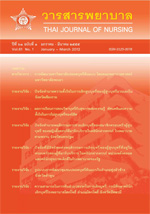ความสามารถในการฟันฝ่าอุปสรรคในการเลิกบุหรี่ : กรณีศึกษาคลินิกเลิกบุหรี่โรงพยาบาลโคกโพธ์ิ อำเภอโคกโพธ์ิ จังหวัดปัตตานี
Main Article Content
Abstract
ผลการวิจัยพบว่าผู้ให้ข้อมูลมีความสามารถใน การฟันฝ่าอุปสรรคในการเลิกบุหรี่ 4 ด้านดังนี้ คือ (1) ด้าน การควบคุมสถานการณ์ ด้วยการสร้างความเข้มแข็งของ จิตใจ พบว่าผู้ให้ข้อมูลทุกคน ได้บอกถึงมีความตั้งใจจริง ในการเลิกบุหรี่ มีความมุ่งมั่นตั้งใจ โดยการสร้างความ เชื่อมั่นและสร้างแรงจูงใจให้ตนเองทุกวัน โดยผู้ให้ข้อมูล 24 คน ได้บอกถึงปรับเปลี่ยนพฤติกรรมตนเอง พยายามหลีกเลี่ยงตัวกระตุ้น เช่น สุรา เบียร์ ชา กาแฟ (2) ด้านการรับรู้ต้นเหตุและความรับผิดชอบต่อปัญหา รับรู้ว่าบุหรี่มีผลต่อสุขภาพของตนเอง พบว่าผู้ให้ ข้อมูลทุกคน ได้บอกถึงการสูบบุหรี่ส่งผลให้มีอาการไอ มีเสมหะในคอ และยังส่งผลให้เกิดอาการเหนื่อยหอบง่าย เวลาออกแรงหรือออกกำลังกาย (3) ด้านการเข้าสู่ปัญหา อย่างมีสติ พบว่าผู้ให้ข้อมูลทุกคน ได้บอกถึงต้องมีจิตใจ เข้มแข็งมั่นคง และหาสิ่งทดแทน หากรู้สึกอยากสูบบุหรี่ เช่น ออกกำลังกาย อ่านหนังสือ หาเครื่องดื่มเย็นๆมาดื่ม และ (4) ด้านความอดทนต่อปัญหา พบว่าผู้ให้ข้อมูล ทุกคน ได้บอกถึงต้องบังคับจิตใจตนเอง และพบว่าผู้ให้ ข้อมูล 22 คน ได้บอกถึง ต้องมีความอดทนอดกลั้น ไม่นึกถึงบุหรี่ และการได้กำลังใจจากคนที่รัก โดยเฉพาะ คนในครอบคัว เช่น ลูกสาว ลูกชาย และภรรยา
ผลการวิจัยครั้งนี้ สามารถเป็นข้อมูลสำหรับทีม สุขภาพ หรือทีมผู้ที่เกี่ยวข้องอื่นๆ ในการนำไปใช้เป็น แนวทางในการวางแผนพัฒนา ส่งเสริม สนับสนุน ความสามารถของผู้ที่ติดบุหรี่ ในการเลิกบุหรี่ได้อย่าง มีประสิทธิภาพ ในระยะยาวอย่างต่อเนื่องยิ่งขึ้นต่อไป
Adversity Quotient of Persons Who Can Quit Tobacco: A Case Study of smoking cessation clinic Khokpho Hospital, Khokpho District, Pattani Province
Kaewnawee,J., Poolsawas U., Buakhow W.
The purpose of this descriptive study was to describe adversity quotient of persons who can quit tobacco in smoking cessation clinic Khokpho hospital, Khokpho district, Pattani province. The sample comprised 30 persons. The questionnaire, based on Stoltz (1997) framework and related literature, consisted of two parts: 1) demographic data, and 2) adversity quotient behavior interview guideline. The content validity of the questionnaire was assessed by 3 experts. Data were analyzed by content analysis, frequency and percentage.
The findings of the study revealed that subjects had adversity quotient within 4 aspects as follows: (1) control: Strengthening their mind, all subjects showed their intention to quit smoking, have committed to quit smoking, by enhancing their confidence and motivation every day. Twenty-four subjects modified their behaviors by trying to avoid stimulus such as liquor, beer, coffee and tea; (2) origin and ownership: recognizing the affect of smoking or health. all subjects realized that smoking causes a cough, and secretion, perceived health impacts and felt tired easily when exercise; (3) reach: all subjects mentioned that quitting smoking need commitment, and looking for substitutes, such as exercise, reading books, cold drink; (4) endurance: all subjects had to control their mind, don't think about cigarette. Twenty-two subjects indicated that they had to control themselves and need support from their beloved one, in particular family members as son, daughter, wife.
The findings could be used a guideline for health teams to plan for smoke cessation program, to enhance cigarette users to quit smoking in the future.


